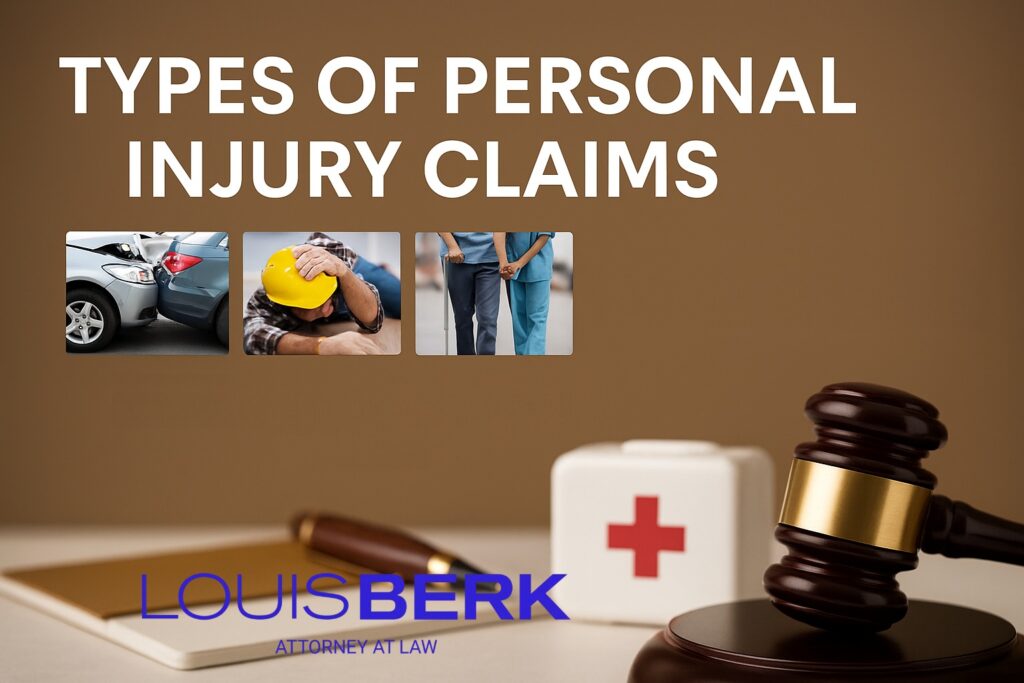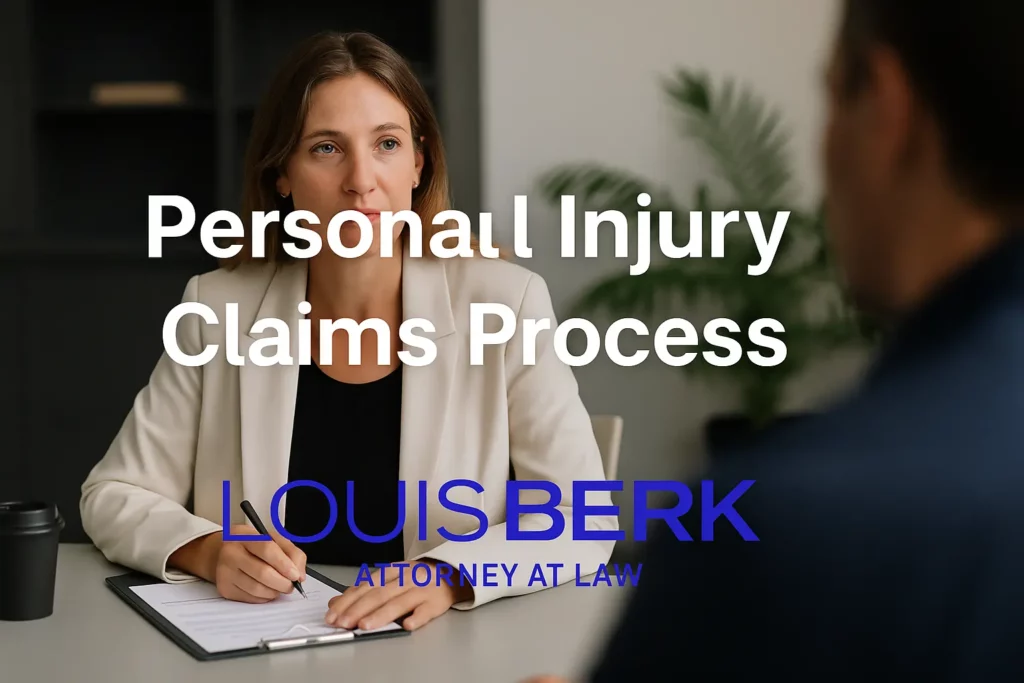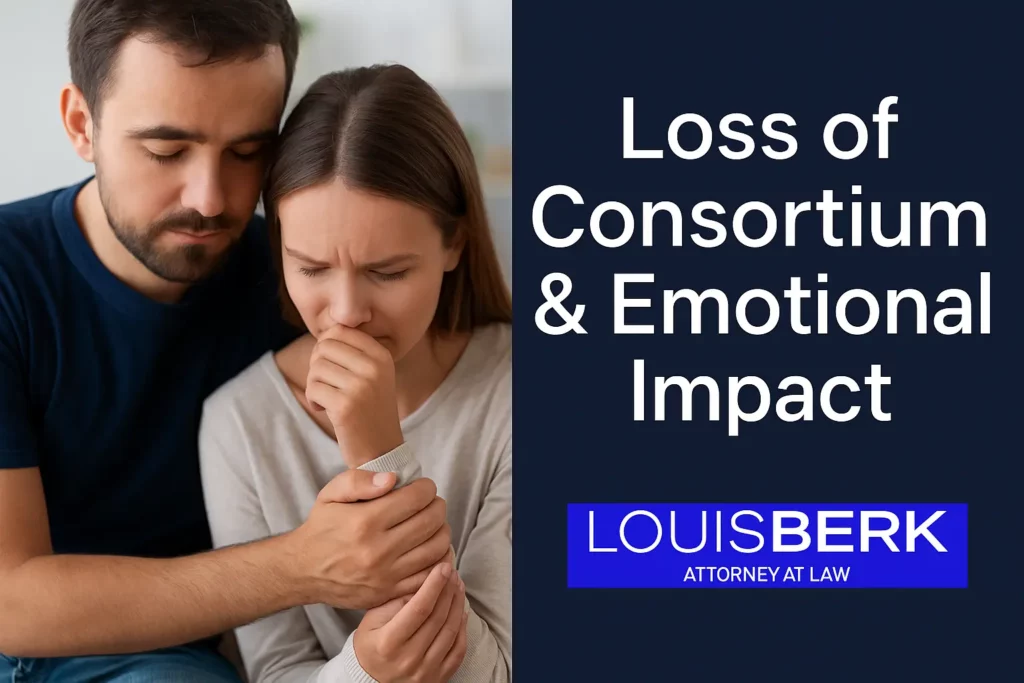
Puntos clave: ¿
a su demanda por lesiones personales?
Índice
Más de 50 millones de dólares

¿Ha sufrido una lesión y está pensando en presentar una demanda?

Cuando la negligencia de otra persona le hace perder el rumbo de su vida, no es sólo la lesión lo que tiene que afrontar, sino también las facturas médicas, la pérdida de trabajo, el estrés y la sensación de que su vida ya no está bajo su control. Pero aquí está la línea de fondo: usted puede tomar ese control de nuevo. La presentación de una demanda por lesiones personales no se trata de empujar papeles, es la forma de defenderse y obtener lo que se le debe legítimamente.Si usted se lastimó en un accidente de coche, se resbaló en un piso mojado, o sufrió cualquier otra lesión evitable en la Florida, esta guía le da los hechos rectos. Y si usted está buscando ayuda personalizada desde el primer día, nuestros abogados de lesiones personales en Orlando están aquí para guiarle a través de cada paso. Vamos a caminar a través de exactamente qué hacer, cómo evitar errores costosos, y cómo construir un caso sólido desde el primer día.
¿Qué significa presentar una demanda por lesiones personales?
¿Se pregunta qué significa presentar una demanda por daños personales? Significa que está emprendiendo acciones legales formales para exigir una indemnización a la persona (o empresa) responsable de sus lesiones. Y en Florida, el tiempo corre: las víctimas suelen tener sólo dos años para actuar, según el artículo 95.11 de los Estatutos de Florida:
- Gastos médicos, incluido el tratamiento futuro (sí, la ley de Florida lo permite).
- Pérdida de ingresos: los salarios que ha dejado de percibir y su potencial de ingresos reducido.
- Dolor y sufrimiento: el peso invisible que nadie ve pero que tú llevas cada día
- Daños materiales, como un vehículo siniestrado o un equipo dañado.
💡 Según el Departamento de Seguridad de Carreteras y Vehículos Motorizados de Florida (FLHSMV), hubo más de 394,000 choques en 2023, muchos resultando en lesiones graves y eventuales acciones legales.
Reclamación por lesiones personales en Florida: Lo que debe saber
Reclamar por lesiones personales en Florida no es sólo contar su versión de los hechos, es construir un caso legal sólido como una roca. Para ganar, usted (o su abogado) debe probar:
- Culpa: alguien ha actuado con negligencia
- Causalidad: que la negligencia causó su lesión
- Daños: ha sufrido pérdidas cuantificables
Si te has lesionado en un accidente de tráfico, en Florida se aplican las normas de no culpabilidad. Usted está obligado a presentar primero una reclamación de protección contra lesiones personales con su aseguradora, independientemente de quién causó el accidente.⏱️ Importante: Usted debe obtener atención médica dentro de los 14 días del accidente para tener derecho a beneficios de PIP. Si esperas demasiado, puedes perder miles de euros en indemnizaciones.
Tipos de demandas por daños corporales (desde lesiones corporales a accidentes de tráfico)

Seamos específicos. Las demandas por lesiones personales enFlorida no son de talla única. Cada tipo tiene diferentes normas legales y opciones de pago. He aquí un desglose de los más comunes:
1. Reclamación por daños corporales
Una demanda por lesiones corporales se aplica cuando la negligencia de otra persona le daña físicamente. Esto es común en los accidentes de resbalones y caídas, locales inseguros, o accidentes de coche.📍Ejemplo Real: Un comprador en Miami se resbala en un suelo mojado sin señalizar, sufre una fractura de cadera y presenta una demanda contra el propietario de la tienda.¿Qué ocurre cuando alguien presenta una demanda por lesiones corporales? Tendrá que demostrarlo:
- El demandado tenía un deber de diligencia
- Incumplieron ese deber
- Su incumplimiento causó directamente tus lesiones
Según el Departamento de Salud de Floridalas caídas son una de las principales causas de lesiones no mortales en Florida, especialmente entre las personas mayores.
2. Reclamación de protección por daños personales (PIP)
En los accidentes causados por conducción distraída, exceso de velocidad o saltarse semáforos en rojo, puede presentar una reclamación por lesiones en accidente de tráfico. Como se indica en Estatutos de Florida § 627.736PIP cubre:
- 80% de los gastos médicos razonables
- 60% de los salarios perdidos
- 10.000 $ en PIP
- 10.000 $ en responsabilidad por daños materiales (PDL)
📊 Los informes de FLHSMV muestran que la conducción distraída causó más de 53,000 choques solo en 2023.
3. Reclamación por lesiones en accidente de tráfico
¿No vas en coche? Aún tienes derechos. Una demanda por lesiones en accidente de tráfico cubre peatones, ciclistas, conductores de scooters, y los pasajeros del transporte público, especialmente crucial en un estado con una de las tasas más altas de lesiones de peatones en el país.📍Ejemplo: Un ciclista en St. Pete es atropellado por un vehículo de transporte compartido que gira. Pete es atropellado por un vehículo de transporte compartido que gira. Puede presentar una demanda contra el conductor y, potencialmente, contra la empresa de transporte compartido, dependiendo de los hechos del caso.
4. Reclamación por lesiones en accidente de tráfico
Esta es la reclamación por lesiones en accidente de coche más frecuentemente presentada. Si sus lesiones cumplen con el umbral de "lesiones graves" de la Florida bajo § 627.737, usted puede tener derecho a una indemnización más allá de PIP, tales como:
- Dolor y sufrimiento
- Incapacidad permanente
- Angustia emocional
Florida es uno de los estados más peligrosos para los peatones. Si usted fue atropellado mientras caminaba o cruzaba la calle, nuestros abogados de accidentes de peatones pueden ayudar a proteger sus derechos y responsabilizar al conductor.📝 Consejo: Documéntalo todo: visitas médicas, niveles de dolor, tiempo perdido en el trabajo. Todo son pruebas.
5. Reclamación por daños personales a terceros
A veces, la parte responsable no es un conductor o negocio-es un tercero, como un contratista, fabricante o proveedor de equipos. En estos casos, puede que tenga que presentar una demanda por lesiones personales de terceros, además de otras acciones.📍Ejemplo: Un trabajador de la construcción se lesiona por una escalera defectuosa. Recibe compensación de trabajadores, pero también demanda al fabricante de la escalera por responsabilidad del producto.Escenarios comunes de terceros:
- Negligencia en las obras
- Equipos o productos defectuosos
- Fallos de seguridad en los espacios comerciales
Proceso de reclamación por daños personales: Hoja de ruta paso a paso hacia la indemnización

Cuando las acciones descuidadas de alguien le dejan herido, confundido, y nadando en las facturas, hay una cosa que usted necesita: un plan que funcione. Presentar una demanda por lesiones personales en Florida no es sólo papeleo, se trata de hacer que el sistema trabaje para usted. Y la verdad es que cada paso es importante. Esta guía le guía a través del proceso de reclamaciones por lesiones personales, utilizando ejemplos reales y las mejores prácticas legales para que pueda proteger sus derechos y luchar por una indemnización justa, ya se trate de un accidente de coche, resbalón y caída, o cualquier otro accidente causado por la negligencia de otra persona.
Paso 1: Busque atención médica de inmediato.
Tu salud es lo primero, pero en Florida también determina tu derecho a cobrar prestaciones. Bajo el sistema sin culpa, usted debe buscar tratamiento médico dentro de los 14 días del accidente para tener derecho a una reclamación de protección contra lesiones personales (PIP).📍 Ejemplo: Un conductor de Tampa herido en un accidente por alcance espera 16 días antes de acudir al médico. Su aseguradora PIP niega la cobertura, a pesar de que sus lesiones son legítimas. No deje que una fecha límite perdida le cueste todo.Para desbloquear los beneficios completos de PIP (hasta $ 10,000), un proveedor con licencia debe diagnosticarle con una condición médica de emergencia (EMC). Los profesionales cualificados incluyen MDs, quiroprácticos, dentistas, o proveedores referidos por ellos. ¿No tiene EMC? El límite podría ser de sólo 2.500 $.
Paso 2: Bloquear las pruebas rápidamente
La verdad no habla por sí sola: hay que documentarla. Sin pruebas, incluso una sólida demanda por lesiones personales puede desmoronarse.Esto es lo que debe recoger desde el principio:
- Informes de accidentes o incidentes
- Historiales médicos de todos los proveedores de tratamiento
- Fotos del lugar de los hechos, heridos y daños materiales
- Nombres de los testigos e información de contacto
- Copias de todas las comunicaciones sobre seguros
📍 Ejemplo: Un comprador de Jacksonville resbala en un suelo mojado. Gracias a las imágenes de vigilancia de la tienda y un informe escrito del incidente, su abogado demuestra negligencia, incluso después de que la tienda niega haber actuado mal.Consejo: Mantenga todo organizado. Los registros desorganizados son una de las principales razones por las que se deniegan o infravaloran las reclamaciones.
Paso 3: Notifíquelo al seguro, pero sea estratégico.
En Florida, usted está legalmente obligado a notificar a todas las aseguradoras pertinentes con prontitud, ya sea su compañía de PIP o la aseguradora de responsabilidad civil de la parte culpable. Pero aquí está la trampa: decir demasiado puede perjudicar su reclamo.📍 Cuento con moraleja: Un conductor de Boca Raton casualmente le dice a la aseguradora que "no vio el otro coche", y su declaración se tergiversa en admitir la culpa.Manténgalo simple. Informe del incidente con hechos y consulte a un abogado antes de dar declaraciones detalladas. Según el Estatuto de Florida § 627.736 (4) (b)las reclamaciones PIP válidas deben ser pagadas dentro de los 30 días siguientes a la recepción de la documentación adecuada.
✅ Paso 4: Llame a un abogado de lesiones personales de Florida (Sí, ahora)
Si sus lesiones son graves o permanentes, o si le están ofreciendo un precio muy bajo, deje de actuar solo. Un abogado experto no es un lujo, es su ventaja. Colegio de Abogados de Florida recomienda contratar a un abogado cuando:
- Sus lesiones son de larga duración o incapacitantes
- La aseguradora discute la culpa o retrasa los pagos
- Te están presionando para que pagues menos.
📍 Ejemplo: Un motociclista en el condado de Broward recibe una oferta de 12.000 dólares. Después de contratar a un abogado de lesiones personales, el acuerdo final llega a $ 285,000, que cubre el tratamiento, salarios perdidos, y el dolor y el sufrimiento.
✅ Paso 5: Presentar la reclamación antes de que se agote el plazo
En Estatutos de Florida § 95.11(4)(a)tiene dos años a partir de la fecha de la lesión para presentar una demanda. Si no lo hace, perderá su derecho a demandar, sin excepciones. Las reclamaciones de seguros, especialmente bajo PIP, deben ser presentadas mucho antes: Actúe rápido. Incluso si usted todavía está recibiendo tratamiento, a partir de principios construye su caso, mientras que la evidencia es fresco.
Paso 6: Negociar o litigar
Una vez presentada la demanda por lesiones personales, el abogado negocia con la compañía de seguros. La mayoría de los casos se asientan, pero si la oferta es injusta, el litigio es el siguiente paso.herramientas de negociación incluyen:
- Cartas de reclamación
- Mediación
- Deposiciones
- Preparación del juicio
Ejemplo: En Clearwater, un caso de camiones se resuelve por $ 310,000 después de un testimonio médico experto en el juicio-desde una oferta inicial de $ 40,000.Si las conversaciones de liquidación se estancan o la aseguradora no cederá, su próximo paso puede ser una demanda. Para entender mejor ese proceso, consulte nuestra Guía de demandas por lesiones personalesdonde desglosamos los plazos, las expectativas del tribunal y cómo prepararse para el juicio.
¿Cuánto dura una demanda por lesiones personales en Florida?
No hay una respuesta única para todos los casos. Pero aquí está una línea de tiempo general basado en el tipo de caso:Tipo de CasoTiempo EstimadoResponsabilidadClara + Lesiones Menores3-6 mesesLesión Moderada o Culpa Disputada6-12+ mesesLitigio Completo (Juicio)12-24+ mesesLa mayoría de los reclamos se resuelven antes del juicio, pero saber cómo se negocian y calculan los acuerdos es crucial. Nuestra Guía de Acuerdos por Lesiones Personales le guía a través de ejemplos reales, estructuras de pago y consejos para maximizar su compensación.
¿Piensa actuar solo? Cómo presentar una demanda por lesiones personales sin abogado
Sí, puede presentar su reclamación en Florida. Pero eso no significa que deba hacerlo. Representarse a sí mismo es arriesgado, y las leyes de lesiones de Florida están diseñadas pensando en las compañías de seguros, no en las víctimas:
- Incumplimiento de plazos
- No probar la causalidad médica
- Subestimación de los costes futuros
- Aceptar ofertas a la baja
Por qué es arriesgado: las trampas del pro se
Los tribunales de Florida admiten litigantes pro se (los que se representan a sí mismos), pero se siguen aplicando las normas sobre pruebas, procedimiento y valoración de casos. Según la guía del consumidor sobre lesiones personales del Colegio de Abogados de Florida, muchos demandantes que se representan a sí mismos:
- Incumplimiento de los plazos legales
- No probar la causalidad médica
- Subestimar las necesidades médicas futuras
- Pasar por alto daños no económicos como el dolor y el sufrimiento
- Aceptar ofertas de liquidación a la baja por falta de poder de negociación.
Ejemplo: Una víctima de accidente de coche en el Condado de Orange presentó su propia reclamación PIP, pero no proporcionó documentación de un proveedor médico calificado dentro de los 14 días. Bajo los Estatutos de Florida § 627.736 (1) (a), su reclamo fue negado de plano, a pesar de las lesiones válidas.
En qué consiste presentar una demanda sin abogado
Si usted todavía está considerando la presentación de su demanda por lesiones personales, esto es lo que usted es responsable de:1. Entender la estructura de seguros de la Florida: Usted debe saber cuando PIP se aplica, cómo acceder a la cobertura, y cuando se le permite dar un paso fuera del sistema sin culpa y perseguir una reclamación de responsabilidad civil. MyFloridaCFO proporciona guías para el consumidor sobre PIP y cobertura de automóviles.2. Recopilación y conservación de pruebas: Usted necesitará registros médicos, informes de accidentes (obtenerlos aquí), información de contacto de testigos y pruebas fotográficas para construir su reclamo3.Determinar los daños: Tendrás que calcular:
- Gastos médicos (pasados y futuros)
- Pérdida de ingresos
- Daños materiales
- Dolor y sufrimiento (daños no económicos)
- Un cálculo erróneo puede dejar sobre la mesa miles de euros o, lo que es peor, hacer que su reclamación sea desestimada por falta de pruebas.
4. Comunicación con las compañías de seguros: Esto incluye presentar una carta de demanda, responder a los peritos y revisar las ofertas de acuerdo. Las aseguradoras saben que usted no está representado y actúan en consecuencia.5. Presentar una demanda (si fracasa el acuerdo): Debe presentar la demanda adecuada, notificar al demandado y cumplir todas las normas de procedimiento civil del tribunal. Consulte el Centro de Autoayuda de los Tribunales de Florida para orientación pro se, pero tenga cuidado: está diseñado para casos básicos, no para demandas complejas por lesiones.
Reclamaciones por lesiones personales exageradas: No juegue con los hechos
Cuando se trata de presentar una demanda por lesiones personales, la honestidad no es opcional, es la base de todo su caso. En Florida, tratar de estirar la verdad en su reclamo no sólo es contraproducente, sino que puede llevarlo tras las rejas. En Estatutos de Florida § 817.234presentar información falsa o engañosa en una reclamación de protección contra lesiones personales es un delito grave. No estamos hablando de un tirón de orejas - se trata de un cargo criminal real que puede descarrilar su futuro y destruir su credibilidad.
Lo que dice la ley
La ley de Florida es muy amplia cuando se trata de fraude al seguro. No se trata sólo de fingir una lesión - cualquier tergiversación en una reclamación por lesiones de accidente de coche u otro incidente puede calificar. Esto incluye:
- Inflamación del dolor o de los síntomas
- Presentar facturas médicas falsas o manipuladas
- Fingir o simular un accidente
- Reclamar un perjuicio que nunca se produjo
Si te pillan, podrías enfrentarte a:
- Hasta 5 años de prisión (delito grave de tercer grado)
- 5.000 dólares de multa
- Consecuencias a largo plazo de cualquier futura reclamación por daños personales
📍 Ejemplo de caso real: En 2022, la División de Fraude de Seguros de Florida arrestó a varios individuos en Miami-Dade por escenificar accidentes automovilísticos y presentar registros quiroprácticos falsos. Su esquema fraudulento de reclamaciones por lesiones en accidentes automovilísticos se desentrañó rápidamente, lo que condujo a cargos por delitos graves y exposición pública.
Pérdida de consorcio e impacto emocional

No todos los daños son visibles en una radiografía. Cuando un accidente grave destroza un matrimonio o una relación duradera, las consecuencias emocionales pueden ser devastadoras. Ahí es donde entra en juego la reclamación por pérdida de consorcio, una parte vital del proceso de reclamación por lesiones personales que a menudo se pasa por alto.
¿Qué es la pérdida de consorcio?
Es el término legal para referirse a la pérdida del apoyo emocional, físico y relacional que su cónyuge o pareja solía proporcionarle. Estamos hablando de:
- Afecto y compañía
- Apoyo emocional
- Intimidad sexual
- Responsabilidades compartidas en el hogar
La ley de Florida permite al cónyuge no lesionado presentar una demanda derivada, pero sólo en matrimonios legalmente reconocidos. Las parejas no casadas de larga duración, por muy comprometidas que estén, no tienen suerte en este caso.
¿Qué hay que demostrar?
La pérdida de consorcio no se concede a la ligera. Usted debe demostrar:
- Un matrimonio válido en el momento del perjuicio
- Que la lesión de su pareja fue causada por negligencia ajena
- Que su relación se ha visto sustancialmente perjudicada
- Pruebas claras: informes periciales, testimonios, historiales médicos o notas de asesoramiento.
No basta con decir "las cosas han cambiado", hay que demostrar el impacto en la vida real.
Ejemplo
Imaginemos una pareja de Orlando implicada en un accidente de moto. El marido sufre daños en la columna vertebral y parálisis parcial. Mientras que su demanda por lesiones corporales cubre sus daños directos, su esposa presenta una demanda por pérdida de consorcio, esbozando:
- Pérdida de intimidad
- Trauma emocional
- Estrés añadido por las nuevas tareas de cuidado
- Desconexión en la comunicación y el compañerismo
El tribunal tiene en cuenta los testimonios de cónyuges, terapeutas e incluso familiares para determinar la carga emocional. En casos trágicos en los que un ser querido pierde la vida debido a la negligencia de otra persona, nuestros Orlando muerte injusta abogados ayudan a las familias a buscar justicia y cierre financiero.
Asesoramiento de confianza sobre reclamaciones por accidente de auténticos expertos jurídicos
Presentar una reclamación en Florida no consiste sólo en saber lo que significa presentar una reclamación, sinotambién en saber lo que no hay que hacer. Seguir los consejos de los sitios web nacionales puede arruinar su caso. La ley de Florida es única: los plazos estrictos, las peculiaridades de seguro sin culpa, y las aseguradoras difíciles significa que usted necesita una estrategia específica de la Florida, no una talla única para todos sin sentido.
Plazos críticos de reclamación en Florida
- 14 días para recibir tratamiento tras un accidente de tráfico con cobertura PIP
- 2 años para presentar la mayoría de las demandas por daños personales en virtud del artículo 95.11
Si incumple cualquiera de los dos plazos, su caso puede venirse abajo incluso antes de empezar.
No caiga en la trampa del bricolaje
Si está pensando en intentarlo (cómo presentar una demanda por lesiones personales sin abogado), tenga cuidado: sin orientación jurídica experta, la mayoría de las víctimas:
- Se conforman con menos de la mitad de lo que se les debe
- Pasar por alto daños ocultos como el lucro cesante futuro o los costes de terapia.
- Aceptar la culpa injusta de aseguradoras entrenadas para minimizar los pagos
Ejemplo: Una víctima de un accidente en el condado de Hillsborough utilizó una calculadora online y llegó a un acuerdo por 25.000 dólares. Con la ayuda legal adecuada, su caso podría haber alcanzado más de 250.000 dólares, teniendo en cuenta los daños no económicos y el tratamiento futuro.
Lo que hay que llevarse de Louis Berk Law: Verdad, estrategia y resultados reales

Una demanda legítima por lesiones personales se basa en hechos claros, pruebas documentadas y una estrategia experta. No sabotee su futuro con reclamaciones por lesiones personales exageradas; el coste es demasiado alto, y el sistema legal de Florida no se lo pondrá fácil.Si se ha lesionado, empiece por documentar los hechos, obtener atención médica y hablar con un abogado cualificado que conozca las leyes de este estado por dentro y por fuera. Porque saber cuánto tarda una demanda por lesiones personales no es tan importante como hacerlo bien desde el primer día.📞 ¿Necesitas ayuda?Póngase en contacto con nosotros hoy para una consulta gratuita. Te escucharemos, investigaremos y construiremos un plan real basado en tu vida, no en atajos legales.
Preguntas frecuentes sobre la presentación de una demanda por lesiones personales
¿Qué es una reclamación por daños personales?
Una demanda por lesiones personales es una acción legal que usted presenta para reclamar una indemnización por las lesiones causadas por la negligencia de otra persona. Esto incluye gastos médicos, pérdida de ingresos, dolor y sufrimiento, y daños a la propiedad.
¿Cuánto tiempo tengo para presentar una demanda por lesiones personales en Florida?
Según el artículo 95.11 de los Estatutos de Florida, por lo general se dispone de dos años a partir de la fecha de la lesión para presentar una demanda. Para las reclamaciones de accidentes de auto que implican PIP, usted debe buscar atención médica dentro de los 14 días del accidente para tener derecho a beneficios.
¿Necesito un abogado para presentar una demanda por lesiones personales en Florida?
Aunque legalmente es posible presentar una demanda sin abogado, es arriesgado. Las leyes de seguros de Florida son complejas, y los reclamantes auto-representados a menudo no cumplen los plazos, aceptan ofertas bajas, o no logran probar sus daños. Un abogado de lesiones personales cualificado puede mejorar significativamente su resultado.
¿Qué tipos de demandas por daños personales puedo presentar?
Los tipos más comunes son: Reclamaciones por lesiones corporales (por ejemplo, resbalones y caídas) Reclamaciones por lesiones en accidentes de automóvil Reclamaciones PIP (Protección contra Lesiones Personales) Reclamaciones por responsabilidad civil de terceros (por ejemplo, defectos de productos o negligencia en obras de construcción) Pérdida de consorcio (presentada por un cónyuge).
¿Cómo inicio el proceso de reclamación por daños personales?
Usted debe: Buscar atención médica inmediata. Documentar el incidente (fotos, información sobre testigos, informes policiales). Notificarlo a las aseguradoras, pero evite hacer declaraciones detalladas sin un abogado. Ponerse en contacto con un abogado de lesiones personales para iniciar el proceso formal de reclamación.
¿Puedo reclamar aunque haya tenido parte de la culpa?
Sí. Florida sigue una regla de negligencia comparativa modificada. Usted puede recuperar la indemnización, siempre y cuando usted no es más del 50% de culpa, pero su pago se reducirá en función de su parte de la culpa.
¿Qué ocurre si exagero o miento en mi demanda por lesiones personales?
No lo haga. Presentar información falsa o engañosa es un delito grave según el artículo 817.234 de los Estatutos de Florida. Podría enfrentarse a cargos penales, multas y perder su credibilidad, incluso en futuras reclamaciones legítimas.
¿Cómo se pagan las reclamaciones por daños personales?
Una vez resuelto el caso, su indemnización puede consistir en un pago único o en un acuerdo estructurado. Tu abogado puede ayudarte a decidir qué se ajusta mejor a tus necesidades médicas, económicas y a largo plazo.
¿Qué es una demanda por pérdida de consorcio?
Se trata de una reclamación presentada por el cónyuge de la persona lesionada por las pérdidas emocionales, físicas y relacionales causadas por la lesión. Solo está disponible en matrimonios legalmente reconocidos y debe demostrar un impacto significativo en la relación.
Lo sentimos. No se han encontrado artículos.
*** Al proporcionar un número de teléfono, consiente que nos pongamos en contacto con usted mediante mensajes de texto SMS. Pueden aplicarse tarifas de mensajes y datos. Puede responder STOP para no recibir más mensajes y obtener más ayuda enviando AYUDA.



